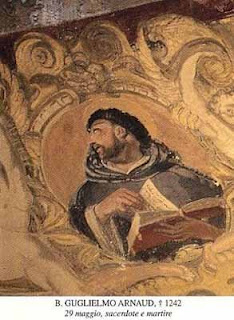10 MAY 2010. The men's Dominican habit is a beautiful thing--black and white to symbolize both purity of life with Christ (white) and penance and mortification (black). Penance and purity of life are not incomplementary, but necessary faith connections. As the Dominican habit forms a beautiful whole, clothing the friar, brother, sister, or nun in a distinctive garment that expresses devotion to our Lord, so too are purity and penance overlain in a life lived in devotion for Christ.
All Dominicans wear the same habit--friars, brothers, cooperator brothers, novices, and even the Master of the Order. As Christ told us to call all our brothers (
cf Mt 23, 8), so too do all Dominican brethren wear the same habit. Lay Dominicans do not wear the habit, but are invested in the large white scapular upon first (temporary) profession into the order. While I am not aware of any regulation that prohibits a lay Dominican from wearing the habit in private, it is my understanding that wearing the habit in public is prohibited. Lay Dominicans, however, may be buried in the habit--in the recognized dress of one of Saint Dominic's children.
Father Lew, O.P.
The basic element of the Dominican habit is the tunic. The tunic is a white woolen one-piece, shoe-top length gown with long sleeves and cuffs. A Dominican first puts on the tunic while praying:
Clothe me, O Lord, with the garments of salvation.
By your grace may I keep them pure and spotless,
so that clothed in white,
I may be worthy to walk with you in the kingdom of God.
Amen.
The next element of the habit is the cincture. The Dominican cincture is a black leather belt with a simple silver buckle. As Saint Thomas Aquinas was girded in chastity his entire life, so to does a Dominican gird himself each day with the cincture of chastity and justice. The cincture became a customary part of the Dominican habit in honor of Saint Thomas, and it is Dominican tradition to ask Saint Thomas for his intercession to protect one's purity. While fastening the cincture, a Dominican prays:
Gird me, O Lord, with the cincture of justice and the cord of purity
that I may unite the many affections of my heart in the love of you alone.
Amen.
Next, a rosary is hung from the cincture on the left side. Today, the Dominicans wear a 20 decade rosary that corresponds to the full Rosary, including the Luminous Mysteries (in addition to the Joyful, Glorious, and Sorrowful mysteries) added by the great and Venerable Pope John Paul II. Typically, the rosary has black beads and hangs from a clip nearer to the wearer's hip, with the crucifix and first several beads of the rosary passed behind and over the cincture towards the wearer's front. While adding the rosary to the cincture, the following prayer is recited:
O God, whose only-begotten Son,
by his life, death, and resurrection,
has purchased for us the rewards of eternal life,
grant, we beseech Thee,
that meditating upon the mysteries of the
Most Holy Rosary of the Blessed Virgin Mary,
we may imitate what they contain and obtain what they promise,
through the same Christ our Lord.
Amen.
Now with the cincture and rosary in place over the tunic, the Dominican puts on the scapular. The scapular is a long white strip of cloth (about shoulder width), with a hole for the head, that is worn over the shoulders, extending to near the bottom of the tunic in the front and the back. The scapular was given to Blessed Reginald of Orleans by our Blessed Mother for him to pass on to Saint Dominic. The scapular was traditionally the most important article of the habit, signifying one as definitively a member of an order. The Dominican scapular is put on while saying this prayer:
Show yourself a mother,
He will hear your pleading
Whom your womb has sheltered
And whose hand brings healing.
Next, the Dominican habit is composed of the white capuce, a short rounded shoulder cape that has a white hood attached to it. The capuce is the only head covering used by Dominicans liturgically, and fits over the scapular. While donning a capuce, a Dominican prays:
Lord,
You have set your sign upon my head
that I should admit no lover but you.
Amen.
The two most distinctive parts of the Dominican habit follow next. Over the white capuce is worn the cappa magna, a long black cloak that is equal in length to the tunic and scapular. In England, Dominicans are casually referred to as Blackfriars in reference to the large black cappa magna. Overlaying the purity of life, because we are men, struggling with sin, lays the cappa magna symbolizing necessary penance. The black cappa magna was part of the original Dominican habit given to Blessed Orleans by our Blessed Mother. While putting on the cappa magna, a Dominican prays:
We fly to your patronage, O Holy Mother of God,
do not despise our prayers in our necessity,
but free us from all peril, O Blessed Virgin.
Amen.
Finally, the Dominican puts on the black capuce, with hood, which overlays the cappa magna and serves as an outer black shoulder cape and covering for the hood. The black capuce completes the Dominican habit and, along with the cappa magna, is traditionally always worn by a Dominican while outside the convent, and in the convent too from All Soul's Day until the Gloria of the Easter Vigil.
Given the fact that the Dominican habit was designed by our Blessed Mother, herself, it is no wonder that many have exclaimed that is the most beautiful habit in the Church. A wonderful step-by-step photographic explanation of the Dominican habit is available at
this website. And, a thoughtful and spiritual explanation of the Dominican habit, by Father Lew, O.P., can be found
here.





































